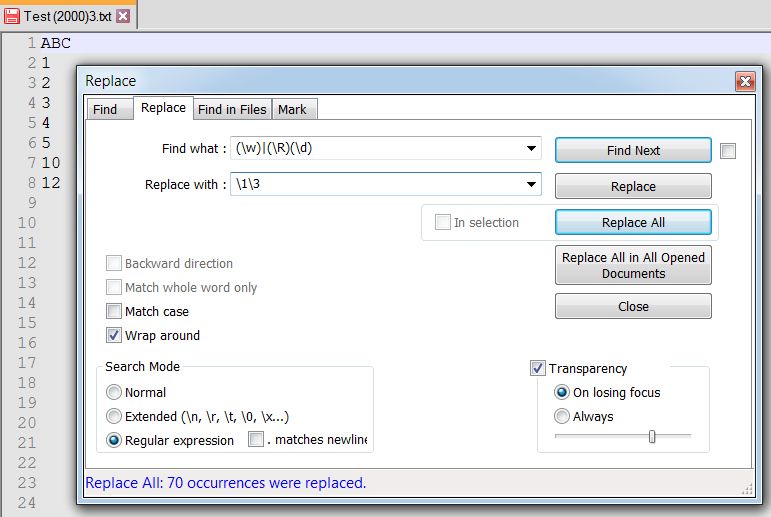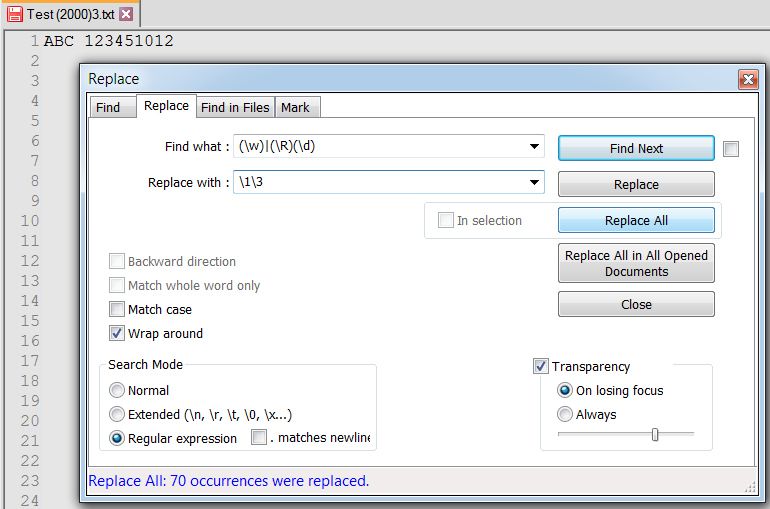RegEx problems
-
@Pan-Jan said in RegEx problems:
when is it necessary to use this
(?1)That is the “conditional replacement” notation, described at https://npp-user-manual.org/docs/searching/#substitution-conditionals
Basically, @Terry-R’s replacement regex says
(?1\1\x20)= if group1 (the\w+$subpattern) matched, then include the contents of group1 followed by a space in the replacement(?2\3)= if group2 (the newline followed by one or more digits) matched, then include the contents of group3 (just the digits from inside group2) in the replacement
Your replacement
\1\3will strip out the newlines, but it will not put a space after theabcand before the123. If that’s okay with you (even though it violates the original), then your simpler regex will work. But @Terry-R’s regex actually matches the behavior you claimed you wanted. -


-
Posting screenshots without text describing them isn’t going to get you very far.
I think we need to “draw the line” and put a stop to Community members using this forum as a means to “learn regular expressions”.
It isn’t what this site is for.
Sure, asking questions about the “peculiarities” of the N++ regex engine is certainly welcome here, as are general questions of “how to transform data” by noobs that may never even heard of the regular expression concept are also welcome.
But to blatantly use this site as a continual Q-and-A, back-and-forth discussion of common regex concepts is, well, annoying. There are far better places for that type of discussion.
-
This post is deleted! -
Your replacement \1\3 will strip out the newlines, but it will not put a space after the abc and before the 123.
I showed there is a space between ABC and 123451012.Sure, asking questions about the “peculiarities” of the N++ regex engine is certainly welcome here
I think we need to “draw the line” and put a stop to Community members using this forum as a means to “learn regular expressions”.
No comment -
Hello, @pan-jan, @alan-kilborn, @peterjones and All,
Two years ago, about, I said :
By answering, for the most part, to questions, related to regular expressions, ( for years ! ), am I distorting the true purpose of this forum, which should remain, I agree, focused on the features, improvements and bugs of Notepad++ ?
Refer to :
https://notepad-plus-plus.org/community/topic/16509/regex-select-all-from-row-except/16
So, I totally agree with Alan’s assertion ! There are plenty of sites, devoted to regex’s learning :-)) So, @pan-jan, just have a look to this FAQ :
https://notepad-plus-plus.org/community/topic/15765/faq-desk-where-to-find-regex-documentation/1
To my mind, one needs
2weeks, about, to get the basics of regular expressions and, let’s say, between1to3months to fully understand all the subtleties of this pseudo-language ;-))Cheers,
guy038
-
I wrote above that reading texts in a foreign language in such matters does not make sense.
I know Polish and German.For me, what matters is a specific answer.
Then I will analyze and verify it.
If it’s okay, I’ll try to remember it.For me, the lack of a specific answer means that my version is correct.
Simple logic.it works:
Replace With:(?1\1\x20)(?2\3)correct:
Replace With:\1\3Cheers, Thomas 2020.
Chers translated into Polish means the same as: “Your health”
This is what people say when they toast with a glass of vodka in their hands.Unfortunately, that’s how translators work.
Maybe in 20 years it will be better. -
Ok, überzeuge mich das ich es nicht mit einem Troll zu tun habe.
Was ist die Frage, was hast Du gemacht, was war das Resultat und
was hättest Du erwartet?Übrigens, cheers bedeutet im englischen auch Prost,
wird aber auch als Grußwort benutzt.Ok, convince me I’m not dealing with a troll.
What is the question, what did you do, what was the result and
what did you expect?By the way, cheers in English means Prost,
but is also used as a greeting word. -
I don’t know that you needed to bother in this one; he seems to think he has a working expression, from what I can tell.
-
This post is deleted! -
@PeterJones
Replace With:(?1\1\x20)(?2\3)You wrote it
(?1and(?2?. In general, I asked for an example where without this(?1` formula will not work.I counted most on @guy038.
Instead, he sends me elsewhere for a reply.It cannot write that this
(?1or(?2is redundant.So far I think
(?1or(?2is redundant at all.I’m not questioning anyone’s knowledge, but I want to understand it through examples.
And since I have my opinion, I’m definitely a Russian troll.

-
@Pan-Jan said in RegEx problems:
I have a request to show me a specific example,
when is it necessary to use this (?1)If you want an example of where the ?1, ?2 are needed how about searching through old posts here. In particular I found this one which is just perfect for you to get a better understanding.
https://community.notepad-plus-plus.org/topic/16533/how-to-remove-empty-spaces-from-a-particular-tag-regular-expression
Often there are several versions of regexes which will solve the original posters problem. As long as they do fit the examples provided they can be regarded as correct.Your recent images suggesting your revised version will add a space where none is, I do NOT believe it. If you want to prove that it does you need to make ALL characters show including line endings (carriage returns, line feeds etc). To do this use the view menu option to show other characters and “show all characters”. Then post the image again proving that ABC has no space behind and the regex adds one.
Good luck
Terry -
@Terry-R said in RegEx problems:
will add a space where none is, I do NOT believe it.
I don’t believe anymore either.
You were right
ABC was with a space
1
2the space was invisible
formula used there:
Find What:(\w+$)|(\R(\d+))
Replace With:(?1\1\x20)(?2\3)my corrected pattern:
Find What:(\w+)|\R(\d+)
Replace With:(?1\1 )\2https://community.notepad-plus-plus.org/topic/16533/how-to-remove-empty-spaces-from-a-particular-tag-regular-expression
this is an example from this link:<p class=“oyric”> Laurie to her final confrontation with Myers, the masked figure who has her since she escaped. </p>
Output should be:
<p class=“oyric”>Laurie to her final confrontation with Myers, the masked figure who has her since she escaped.</p>formula used there:
Find What:(?s)(?:\G|<p class=“oyric”>)(?:(?!<|>).)*?\K(?:(^\h+)|\h+$|(?<=>)\h+|\h+(?=</p>)|(\h{2,})(?=[^<\h]))
(?1$0)(?2\x20)my corrected pattern:
Find What:(?<=>)\h+|\h+(?=<)|(\h+)
Replace With:?1\x20I can not do without it
?1
It looks like it’s needed.
-
This is correct:
Find What:>\K\h+|\h+(?=<)|(\h+)
Replace With:?1\x20I moved the
(\h+)insideFind What:
>\K\h+|(\h+)|\h+(?=<)
Replace With: ???Is there no solution here?

-
@Pan-Jan said in RegEx problems:
Is there no solution here?
It’s only because I’m intrigued with your questions (with very little to back them up) that I will reply.
You have been requested many times that when posting questions to also supply data (using the black boxes) so that others may see what you have and what you want to get. However in this case I see it seems to refer to the original link I sent in the previous post and to which you have responded with your version of an answer. Now you have altered your own regex and found it doesn’t appear to work I suppose and have presented a new problem to us.
I will point you back to the manual for NPP, specifically the “Control Flow” area in which it references the alternation symbol
|.
https://npp-user-manual.org/docs/searching/#control-flow
Note the sentence
Matches are attempted from left to right.
Possibly this is the issue. Anyways I’m not interested in actually solving your question as the original question was solved sometime ago.But by all means, consider going through old posts and seeing if you can find your own solutions, same or different from the original. That would work well as a self teaching process. There is no need to post your answers on any old posts for us, it will be sufficient that in your mind you have accomplished solving it.
Terry
-
God, it can’t be,
better not to change.